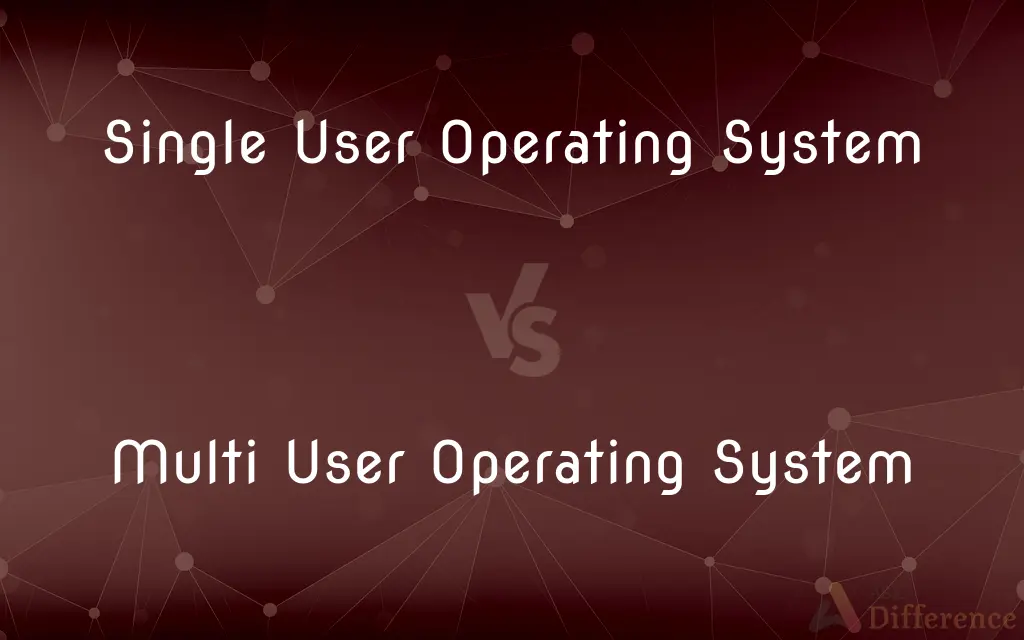Single User Operating System vs. Multi User Operating System — What's the Difference?
By Tayyaba Rehman — Published on December 16, 2023
A Single User Operating System supports one user at a time, while a Multi User Operating System allows multiple users to operate simultaneously.

Difference Between Single User Operating System and Multi User Operating System
Table of Contents
ADVERTISEMENT
Key Differences
A Single User Operating System is designed specifically to cater to one user's needs at any given time. On the contrary, a Multi User Operating System is structured to accommodate multiple users concurrently, often in a networked environment.
In a Single User Operating System, resources are allocated and tailored for one user, ensuring a streamlined experience. A Multi User Operating System, meanwhile, manages resources among various users, ensuring fairness and efficiency.
The Single User Operating System often finds its place in personal devices like desktops and laptops used by individuals. Multi User Operating Systems are predominantly used in server environments, large-scale systems, or mainframes where many users need simultaneous access.
Security considerations vary between the two. A Single User Operating System might focus on personal security and privacy. In contrast, a Multi User Operating System needs stringent security measures to prevent breaches, given the many users accessing the system.
Performance optimization is another distinguishing factor. The Single User Operating System can prioritize tasks for one user, ensuring optimal performance. A Multi User Operating System, however, must juggle and balance tasks from several users, ensuring that no user experiences significant lag or inefficiency.
ADVERTISEMENT
Comparison Chart
Number of Users
One
Multiple
Resource Allocation
Tailored for one user
Managed among various users
Typical Use
Personal devices like desktops and laptops
Server environments, large-scale systems, or mainframes
Security Considerations
Personal security and privacy
Stringent measures due to multiple users accessing
Performance Optimization
Prioritizes tasks for one user
Balances tasks from several users
Compare with Definitions
Single User Operating System
Typically found on personal computing devices.
Most home desktops come with a Single User Operating System installed.
Multi User Operating System
An OS that accommodates several users simultaneously.
The company's server uses a Multi User Operating System to support all employees.
Single User Operating System
Prioritizes the tasks of one user above all else.
On a Single User Operating System, I never have to worry about other users hogging resources.
Multi User Operating System
Requires advanced security measures due to multi-user access.
Our Multi User Operating System has stringent firewalls to prevent breaches.
Single User Operating System
Tailors all system resources for one individual.
The Single User Operating System on my laptop ensures smooth operation for my tasks.
Multi User Operating System
Distributes system resources among various users.
With a Multi User Operating System, resources are allocated efficiently across multiple departments.
Single User Operating System
Provides a streamlined experience without multi-user complexities.
My gaming rig's Single User Operating System is optimized for performance without distractions.
Multi User Operating System
Commonly utilized in larger, networked environments.
Mainframes typically run on a Multi User Operating System to cater to vast user bases.
Single User Operating System
An OS designed for one user at a time.
My personal computer uses a Single User Operating System.
Multi User Operating System
Balances tasks to ensure no user experiences inefficiency.
In a Multi User Operating System, tasks are scheduled to ensure everyone gets fair computational time.
Common Curiosities
Which OS type is found on large-scale servers?
Large-scale servers often utilize Multi User Operating Systems.
Can multiple users access a Multi User Operating System simultaneously?
Yes, a Multi User Operating System is designed for concurrent multi-user access.
Is resource allocation different between the two OS types?
Yes, Single User Operating Systems tailor resources for one, while Multi User Operating Systems distribute among multiple users.
What's the primary user count for a Single User Operating System?
A Single User Operating System supports one user at a time.
Are Multi User Operating Systems typically more complex?
Yes, due to the need to manage multiple users and tasks concurrently.
Is performance optimization different between the two OS types?
Yes, Single User Operating Systems optimize for one, while Multi User Operating Systems balance tasks among users.
Which operating system prioritizes tasks for a single user?
The Single User Operating System does this.
Can I install a Single User Operating System on a server?
Technically yes, but it wouldn't efficiently utilize the server's capabilities for multiple users.
Are mainframes an example of Multi User Operating System usage?
Yes, mainframes typically run Multi User Operating Systems.
Does a Single User Operating System have multi-user capabilities?
No, it's designed specifically for one user at a time.
Are personal computers typically Single User Operating Systems?
Yes, personal computers usually run Single User Operating Systems.
Do all Multi User Operating Systems support an equal number of users?
No, the supported user count varies based on the OS and hardware capabilities.
Is there a significant cost difference between the two?
Multi User Operating Systems, especially for servers, might be pricier due to added complexities and features.
Which operating system type needs more advanced security measures?
Multi User Operating Systems require more advanced security due to multiple user access.
Can I switch my Single User Operating System to a Multi User one?
It would require installing a different OS designed for multi-user support.
Share Your Discovery

Previous Comparison
Kathak Dance vs. Bharatnatyam Dance
Next Comparison
RTF vs. DOCAuthor Spotlight
Written by
Tayyaba RehmanTayyaba Rehman is a distinguished writer, currently serving as a primary contributor to askdifference.com. As a researcher in semantics and etymology, Tayyaba's passion for the complexity of languages and their distinctions has found a perfect home on the platform. Tayyaba delves into the intricacies of language, distinguishing between commonly confused words and phrases, thereby providing clarity for readers worldwide.
















































